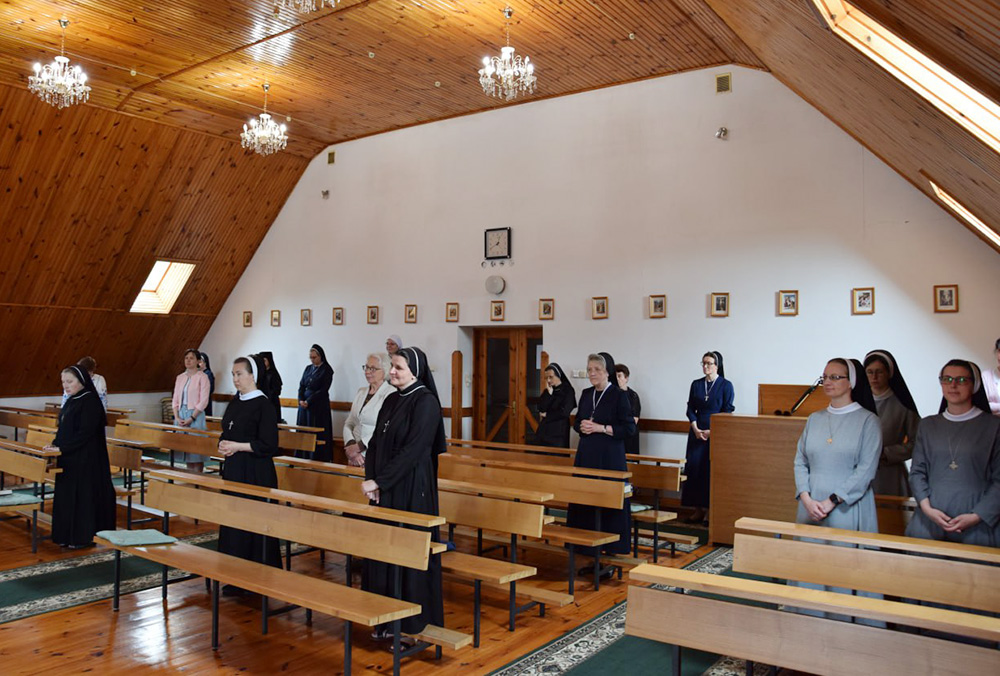
Sisters pose for a group photo at the conclusion of the June 9-17 retreat at the Institute of Theological Sciences of the Immaculate Virgin Mary in Horodok, Ukraine. (Courtesy of Irena Saszko)
For a long time, we debated whether it was appropriate to organize religious gatherings during the war. We hesitated, prayed and contemplated. However, after some time, we concluded that uniting and building bridges is the best thing we could do right now.
As I am an ecumenist specializing in Eastern theology by profession, and as Fr. Sergiy Khytry, my colleague and vice-rector of the Institute of Theological Sciences of the Immaculate Virgin Mary in Horodok, Ukraine, is a catechist and experienced confessor, we started preparing intensively. As a result, from June 9 to June 17, 2023, we managed to hold an eight-day retreat for nuns within the walls of our educational institution.
However, these were not ordinary spiritual exercises. In a time when the Russian Federation stubbornly seeks to sow chaos, bring ruin and death, and create divisions among churches and nations, we decided to organize joint retreats for sisters of both Eastern and Western rites. By doing so, we wanted to testify to ourselves and the church in Ukraine that unity in diversity is a great gift from God.
Twenty-two sisters from both rites, as well as consecrated widows, participated in the spiritual exercises.
The theme of the retreats was the teachings of the Desert Fathers, particularly Evagrius Ponticus, who wrote on the eight spiritual threats. These threats are the so-called negative thoughts (Greek: logismoi), which, if not stopped, can lead to various pathologies in a person's life. These pathologies (Greek: pathi) can manifest on the level of the body (gluttony, impurity, greed), the soul (anger, sorrow, depression), and the spirit (vainglory and pride).

Sisters listen to Irena Saszko speak during a retreat at the Institute of Theological Sciences of the Immaculate Virgin Mary in Horodok, Ukraine. (Courtesy of Irena Saszko)
Each day, the sisters began their mornings with meditation on a Gospel passage related to a particular spiritual threat. During the conferences, they learned to diagnose and apply appropriate prevention or therapy for these threats.
"When Sister Irina accidentally broke a pitcher during the conference, I thought that my life could look like that if I let the spirit of sadness and discouragement into it," one sister shared.
Another said that these retreats rekindled her joy in daily lectio divina practice.
One evening, during the offertory presentation, the sisters washed each other's feet. It was a deeply moving gesture that erased all divisions or misunderstandings. The sisters cried, feeling the presence and tenderness of God.
Many of them confessed that they had found it challenging to pray and trust God lately, as the suffering caused by the war had sown doubt and fear in their hearts. The retreats, however, became a time of healing wounds and restoring a living relationship with the risen Lord.
Additionally, adoration, praying with the Scriptures, and daily 15-minute personal conversations with me or Father Sergiy helped rebuild their spiritual lives, assisting them in dealing with their problems, finding meaning in their life and vocation, and regaining lost hope. Of course, the culmination was the daily celebration of the Eucharist.
Advertisement
Furthermore, the sisters were often given small tasks to perform for Jesus: gathering field flowers, having a simple dinner of bread and water while fasting, or placing a list of their personal thanksgivings in a basket near the altar. These gestures reminded them of God's closeness and love, despite their human weaknesses and shortcomings.
On the last evening, the sisters had a wonderful recreation time, filled with joyful dances and singing. It was evident that, despite the difficult events in Ukraine and their tireless service and self-sacrifice, joy in God became their strength (Nehemiah 8:10).
"I was very tired," shared one sister, who volunteers a lot. "Since the war began, I completely forgot about rest. My thoughts and heart are constantly on the frontlines with our soldiers and the people suffering from the war. But during these retreats, I found peace. I felt that God takes care of everything. I even danced a little."
During the retreats, the sisters learned anew to forgive and trust, to rejoice and cry, to serve and, at the same time, to accept these gifts from another person. These retreats became a school of hospitality and acceptance for all of us.

During a retreat held June 9-17, 2023, sisters participate in the Eucharist in the chapel of the Institute of Theological Sciences of the Immaculate Virgin Mary in Horodok, Ukraine. (Courtesy of Irena Saszko)
There was no sense of division among us. On the contrary, the diversity of liturgical rites, prayer practices and traditions enriched us and opened us to one another. We had the opportunity to realize that truly loving one's neighbor means allowing them to be different.
Not in vain did Jesus pray to the Father in prayer, "that they may all be one ... so that the world may believe" (John 17:21). For our unity is the guarantee of faith in the world. Without this unity, Christianity in general and consecrated life in particular will lose credibility.
"Freedom," "life," "openness," "relationships," "normalcy" — these were the words the sisters used to summarize this week of unity with God and with one another.
Despite the retreats being conducted in silence, the nuns quickly created such a close and friendly community that everyone found it difficult to part at the end. We can say that we all had "one heart and one soul" (Acts 4:32). Even without speaking, the sisters shared clarity of smiles and warmth of gestures.
Before departure, they chatted over coffee for a long time, laughing, sharing impressions and exchanging phone numbers. And most importantly, they promised to meet again after the end of the war to collectively thank God and glorify his name.





